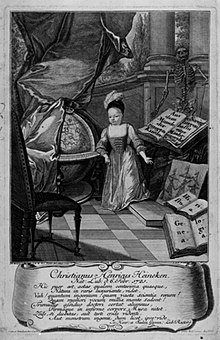

Christian Heinrich Heineken or Heinecken (February 6, 1721 – June 27, 1725), also known as "the infant scholar of Lübeck", was a German child prodigy who lived only to the age of four.
Life
He was born in the Prince-Bishopric of Lübeck, Germany, the son of Paul Heinecken (1674-1746), a painter and architect, and Catharina Elisabeth Heinecken (1683-1757), an artist and alchemist. His brother, Carl Heinrich von Heineken, became an art historian and collector and was later knighted.
It is said that when he was ten months old, he could speak German. He read the Pentateuch at age one, and between the ages of two and three, he read the Old and New Testaments in Latin. When he was three years old, he was said to have recited his own History of Denmark when visiting the King of Denmark. Also at three, he testified in court concerning the murder of his friend, another boy named Reid. He died at age four of celiac disease. He was breastfed until close to his death, which was caused very likely by the ingestion of grain products.
While his exploits may seem difficult to believe, they are relatively well documented. In 1726, his tutor (a man named Schöneich) published a study of Christian entitled The Life, Deeds, Travels and Death of the Child of Lübeck. Immanuel Kant, in his book Anthropology from a Pragmatic Point of View, cited Heineken as an "ingenium praecox" (someone "prematurely clever").
See also
References
- ^ Chisholm, Hugh, ed. (1911). "Heinecken, Christian Heinrich" . Encyclopædia Britannica. Vol. 13 (11th ed.). Cambridge University Press. pp. 215–216.
- ^ Vollmer, Hans (ed.), Allgemeines Lexikon der Bildenden Künstler von der Antike bis zur Gegenwart (General Dictionary of Visual Artists from Antiquity to the Present). Vol. 16, p. 292; vol 21, p. 530; vol. 25, p. 575. Leipzig: EA Seemann, 1923. (In German)
- "Unsterblichkeit der Frühe". Süddeutsche Zeitung. Feuilleton (in German). January 17, 2004. p. 15. Archived from the original on July 21, 2006.
- Kaus J. Hennig (22 December 1999). "Ein Kind zum Anbeten" (in German). Zeit Online GmbH, Hamburg, Germany.
- "The Child of Lubeck". Everything.com.
- Kant, Immanuel, Anthropology from a Pragmatic Point of View, Victor Lyle Dowdell, transl., p.127 (Carbondale, Illinois: Southern Illinois University Press, 1978) (retrieved Jan. 28, 2024).
Other sources
- Barlow, F. Mental prodigies. New York: Philosophical Library, 1952.
- Hollingworth, Leta S., Children Above IQ 180 Stanford-Binet: Origin and Development, Part One, Chapter 3 (1942) (retrieved Jan. 28, 2024).
- Long, G. (ed.). Penny Cyclopaedia. Society for the Diffusion of Useful Knowledge, 1838.
- Guido Guerzoni: The Wonderboy of Lübeck. The extraordinary life of Christian Heinrich Heinecken (English Edition). Turin 2006.